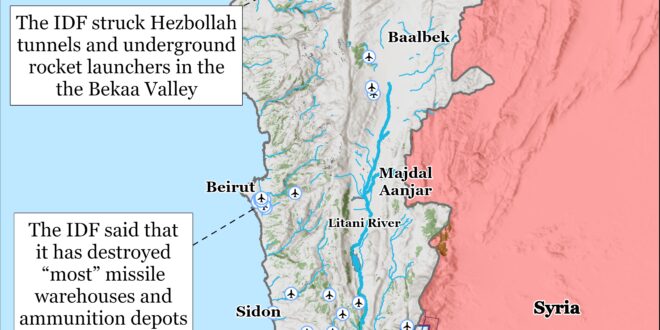Newly-appointed Israeli Defense Minister Israel Katz reaffirmed that the Israel Defense Forces (IDF) will continue its operation in Lebanon until it accomplishes its mission.[1] Katz made these comments during a meeting with the IDF General Staff. Katz replaced Yoav Gallant as defense minister on November 8 and was formerly foreign minister.[2] Katz affirmed that Israel would “continue to hit Hezbollah with full force” to capitalize on past successes like the killing of Hezbollah Secretary General Hassan Nasrallah and “realize the fruits of victory.”[3] He stressed that Israel would not agree to any ceasefire agreement that does not “guarantee Israel’s right to enforce and prevent terrorism on its own,” in addition to other war aims of disarming Hezbollah, forcing a Hezbollah withdrawal north of the Litani River, and returning northern Israeli residents safely home.[4] Katz’s vision is largely consistent with Israeli Prime Minister Benjamin Netanyahu, who has said that Israel needs to push Hezbollah north of the Litani River “with or without an agreement” and that any agreement must include measures to prevent Hezbollah’s reorganization and rearmament.[5]
Israel’s limited operation in frontline border towns of southern Lebanon will not alone accomplish Katz’s outlined goals. The IDF has especially focused on degrading the Hezbollah Radwan special operations forces during the clearing operations.[6] Eliminating the threat of ground attacks is critical to achieving the stated Israeli war aim of returning displaced civilians safely to their homes in northern Israel. Eliminating the threat of ground attacks will not move Hezbollah forces north of the Litani River or prevent rocket attacks from longer-range systems, however. IDF Chief of Staff Lieutenant General Herzi Halevi said on November 6 that the IDF will prepare plans to expand military operations in Lebanon.[7] An Israeli journalist reported that Israel recently informed the United States that its operation in southern Lebanon is “coming to an end” and that Israel is interested in reaching an agreement within a few weeks.[8] US special envoy to Lebanon Amos Hochstein also said on November 12 that “there is a chance to reach a ceasefire in Lebanon soon.”[9] Hezbollah does not yet appear willing to agree to a ceasefire on terms desirable to Israel, however. Hezbollah leadership would moreover likely experience command and control challenges and struggle to enforce a full ceasefire, withdrawal, and disarmament terms among its rank-and-file members—many of whom live south of the Litani River.[10]
A likely Hezbollah drone struck a kindergarten in the Haifa suburb of Nesher on November 12. The drone struck outside the kindergarten while the children were in a bomb shelter and did not cause casualties.[11] Israeli journalists reported that the IDF alert system did not sound in Nesher but did activate in neighboring areas.[12] Hezbollah did not claim a drone attack at the same time or area as the strike, nor did it explicitly acknowledge the strike. Hezbollah similarly did not claim its rocket attack that struck a soccer field of Druze children in Majdal al Shams on July 27.[13] It is more likely that Hezbollah’s Majdal al Shams strike was unintentional and caused by technical failures inherent to rockets. One-way-attack drones, however, are much more accurate than rockets. Drones can still suffer failures and miss their intended targets as a result of electronic warfare or a partial interception. Hezbollah’s decision in early 2024 to transition from less-sophisticated rocket and anti-tank guided missile systems to more advanced and deadly rockets, one-way attack drones, and anti-tank guided missile systems increased the risk that a Hezbollah attack would cause significant Israeli casualties, either intentionally or due to a miscalculation.[14]
Iran and Russia have taken the first steps to create a banking network that circumvents international sanctions. Iranian Central Bank Governor Mohammad Reza Farzin announced on November 11 that Iran and Russia have implemented a new interbank network to circumvent the SWIFT system, which is based on the US dollar.[15] Iran’s Shetab interbank network now works with Russia’s Mir system, which means Iranians can now use Iranian bank cards and withdraw money in Russia.[16] The Shetab-Mir network will also enable Iranians to make online purchases in Russia. Iranian state television channel IRINN stated that this plan will be implemented in Iraq, Afghanistan, and Turkey as well.[17] The creation of this network and its emphasis on reducing dependence on the US dollar is part of a broader Iranian effort to mitigate sanctions and bolster the Iranian economy by building relations with regional and international states.
Growing Russo-Iranian tensions in the Caucasus represent fissures in the bilateral relationship, but both states will likely attempt to prevent the Caucasus issue from derailing wider Iranian or Russian policy objectives. The New York Times published an article on growing Russo-Iranian tensions in the Caucasus that included an interview with the Iranian ambassador to Armenia.[18] The ambassador argued that Iran and Russia ”are not allies” and that they have ”some differences” and ”some mutual interests.” This is in part a reference to the disagreements between Russia and Iran over the Zangezur Corridor project, which is a Turkish project that seeks to connect Azerbaijan proper and the Nakhchivan Autonomous Republic.[19] Such a corridor would sever Iranian land access to Russia and Europe via Armenia at a time when Iran hopes to expand trade with Armenia and Europe.[20] This disagreement is unlikely to derail broader Iranian and Russian efforts to deepen bilateral ties, however. Iran would certainly prioritize sanctions mitigation over secondary policy objectives like the Zangezur Corridor. Iran views sanctions mitigation as a way to enhance regime security by improving its economy.
Key Takeaways:
- Israeli War Aims in Lebanon: Newly-appointed Israeli Defense Minister Israel Katz reaffirmed that the Israel Defense Forces (IDF) will continue its operation in Lebanon until it accomplishes its mission. Katz said that Israel would not agree to any ceasefire agreement that does not “guarantee Israel’s right to enforce and prevent terrorism on its own.” Israel’s currently limited operation in frontline border towns of southern Lebanon will not alone accomplish Katz’s vision.
- Iran-Russia Relations: Iran and Russia have taken the first steps to create a banking network that circumvents international sanctions. The creation of this network and its emphasis on reducing dependence on the US dollar is part of a broader Iranian effort to mitigate sanctions and bolster the Iranian economy by building relations with regional and international states.
- Iran and Russia in the Caucasus: Growing Russo-Iranian tensions in the Caucasus represent fissures in the bilateral relationship, but both states will likely attempt to prevent the Caucasus issue from derailing wider Iranian or Russian policy objectives. The disagreements between the two countries over the Caucasus is unlikely to derail broader Iranian and Russian efforts to deepen bilateral ties. Iran would certainly prioritize sanctions mitigation through a stronger Russo-Iranian relationship over secondary policy objectives like the Zangezur Corridor. Iran views sanctions mitigation as a way to enhance regime security by improving its economy.
- Hezbollah Attack Campaign in Israel: A likely Hezbollah drone struck a kindergarten in the Haifa suburb of Nesher on November 12. The drone struck outside the kindergarten while the children were in a bomb shelter and did not cause casualties. One-way-attack drones are much more accurate than rockets. Drones can still suffer failures and miss their intended targets as a result of electronic warfare or a partial interception.
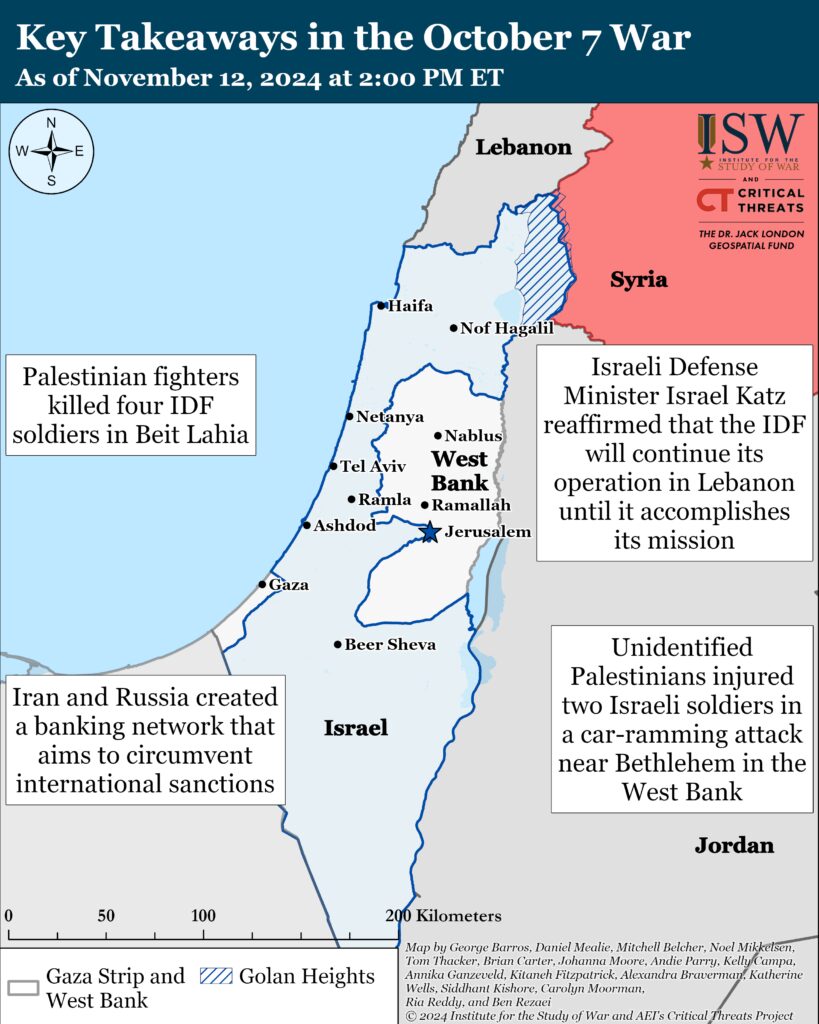
Gaza Strip:
Axis of Resistance objectives:
Erode the will of the Israeli political establishment and public to sustain clearing operations in the Gaza Strip
Reestablish Hamas as the governing authority in the Gaza StripThe IDF 162nd Division continued clearing operations in the northern Gaza Strip on November 12. Hamas and other Palestinian militias conducted multiple attacks targeting Israeli forces and armor within and near Jabalia camp.[21]
The IDF 900th Infantry Brigade destroyed several rocket launch tubes prepared to target Israeli towns during operations in Beit Lahia in the northern Gaza Strip over the past week.[22] Israeli forces located Hamas uniforms, military equipment, rifles, and various weapons components. Israeli forces also killed Palestinian militia fighters who attacked Israeli forces from buildings in Beit Lahia. The IDF said that the 900th Brigade has killed “dozens” of Palestinian militia fighters since the brigade deployed to the northern Gaza Strip on November 2.[23] The IDF said that four Israeli soldiers from the 900th Brigade died in battle in Beit Lahia on November 12.[24]
Palestinian Islamic Jihad (PIJ) and the National Resistance Brigades mortared Israeli forces along the Netzarim Corridor on November 12.[25]
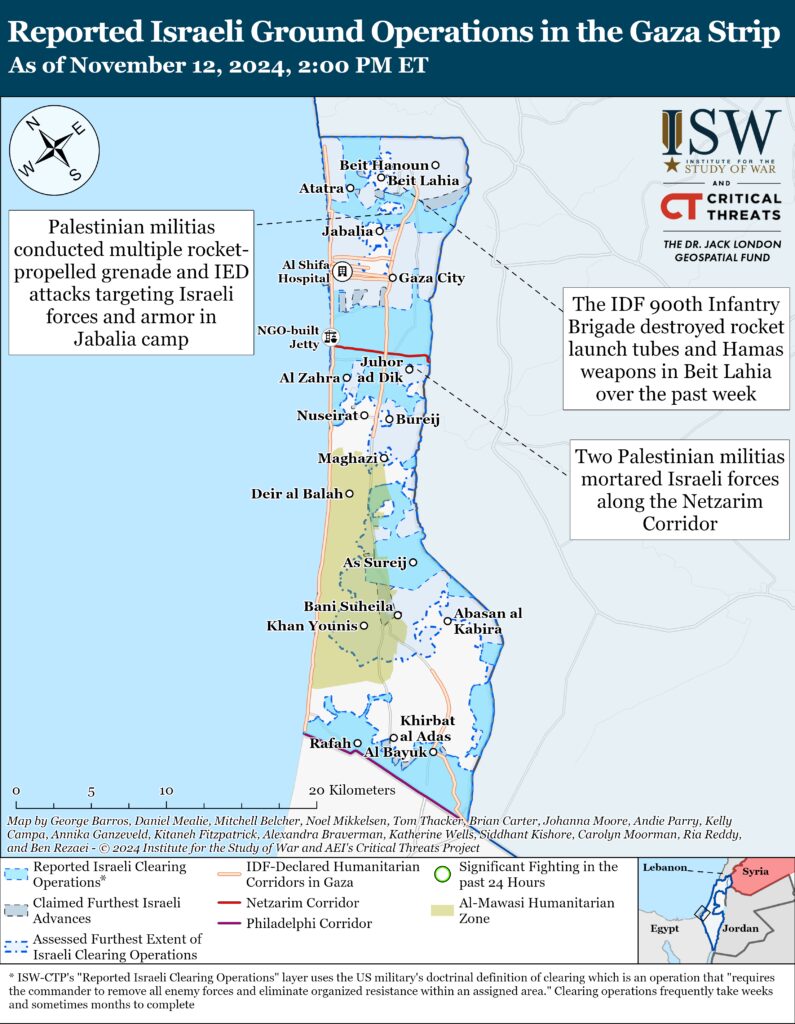
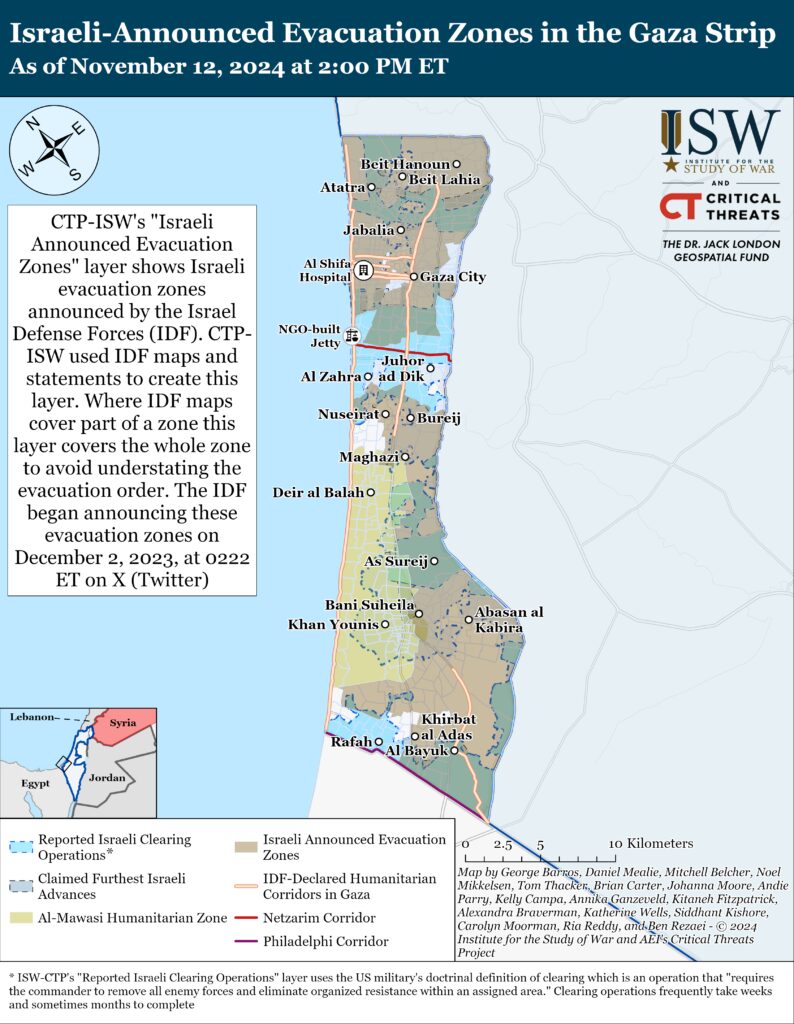
Two US officials reported on November 12 that US Secretary of State Antony Blinken said the United States would not alter its assistance to Israel after Israel took “important steps” to address the humanitarian situation in the Gaza Strip.[26] This decision follows Blinken and US Secretary of Defense Loyd Austin warning senior Israeli officials on October 13 that the US would withhold military assistance to Israel, among additional unspecified steps, if aid was not delivered to non-combatants in the Gaza Strip.[27] Blinken met with Israeli Minister of Strategic Affairs Ron Dermer on November 11 to discuss the humanitarian situation in the Gaza Strip.[28] The Israeli security cabinet approved a series of humanitarian measures for the Gaza Strip on November 11, including increasing the number of aid trucks entering Gaza.[29] The IDF re-opened the Kissufim border crossing near Khan Younis for aid delivery on November 12.[30]
US President-elect Donald Trump selected former Arkansas Governor Mike Huckabee as the new US Ambassador to Israel.[31] Trump said that Huckabee will work to “bring about peace in the Middle East.” Western media has noted Huckabee’s long-standing support for Israel, including for Israeli settlements in the West Bank.[32]
West Bank
Axis of Resistance objectives:
Establish the West Bank as a viable front against IsraelTwo Palestinians conducted a car-ramming attack targeting Israeli soldiers at a checkpoint in al Khader near Bethlehem in the West Bank on November 11.[33] The attack injured two Israeli soldiers.[34] The suspects initially fled but later turned themselves over to the Israeli police.[35] The decision to turn themselves in to police suggests that these Palestinians were not committed militia fighters. Committed militia fighters would be more likely to remain in hiding or be killed at the scene.
Israeli forces thwarted a stabbing attack near Dayr Sharaf in the West Bank on November 12.[36] A Palestinian individual attempted to stab Israeli forces, who killed the individual at the scene.
Palestinian Islamic Jihad (PIJ) fired small arms targeting Israeli military equipment and observation posts on the outskirts of the Shaked settlement in the West Bank on November 12.[37] PIJ last fired small arms targeting Israeli forces near the Shaked settlement on November 3.[38]
Northern Israel and Lebanon
Lebanese Hezbollah objectives:
End Israeli operations in the Gaza Strip
Survive the October 7 War as a capable political and military organization with control over LebanonIsraeli forces have continued clearing operations in southeastern Lebanon since CTP-ISW’s data cut off on November 11.[39] The 769th Territorial Brigade (91st Division) destroyed a Hezbollah military building and confiscated weapons in surrounding civilian buildings. The 769th Brigade has operated south of Khiam in recent weeks.[40] Hezbollah claimed that its fighters launched rockets at elements of the 91st Division operating on the eastern outskirts of Houla.[41] Hezbollah also claimed that it fired anti-tank guided missiles at 98th Division bulldozers and an armored personnel carrier advancing from Kfar Kila.[42]
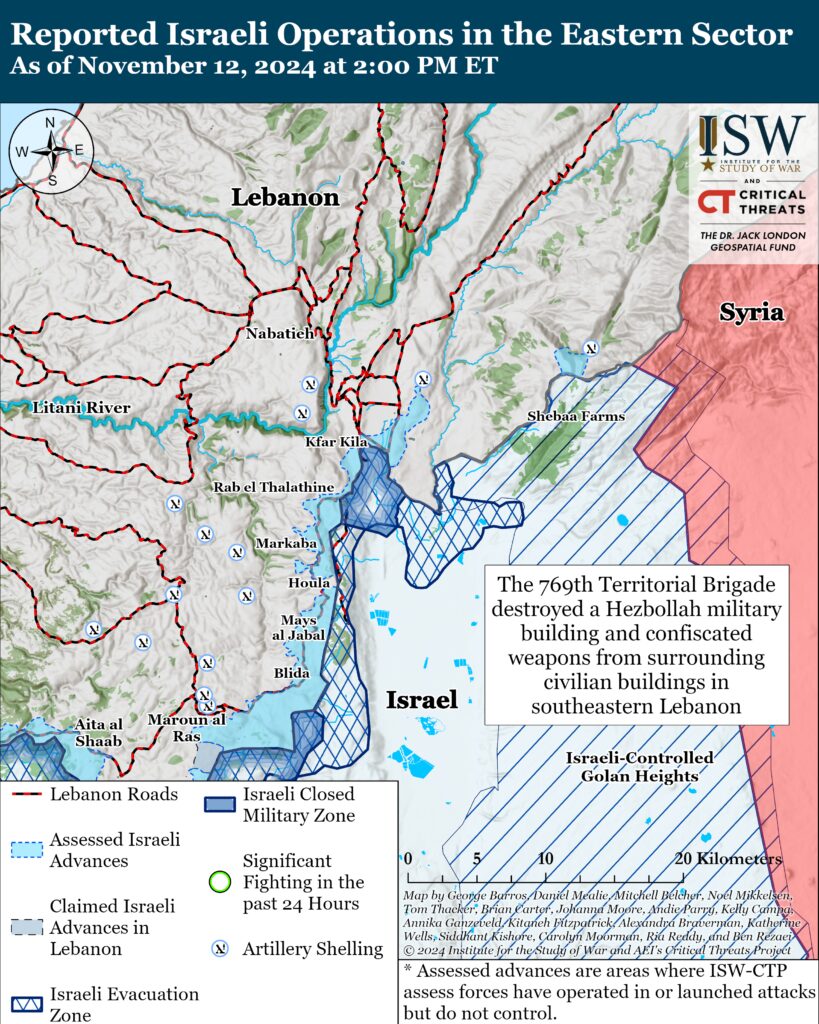
The 36th Division continued clearing operations around Maroun al Ras and Yaroun in southcentral Lebanon on November 12.[43] The 188th Armored Brigade and 1st Golani Brigade located rocket launchers prepared to fire into Israel and other various weapons and military equipment. The 282nd Artillery Brigade and IDF Air Force also conducted strikes on Hezbollah targets. The 36th Division has been operating in Maroun al Ras in recent weeks.[44] The IDF reported that the 36th Division has reached ”new [Hezbollah] targets” during its clearing operation in southern Lebanon.[45]
Hezbollah posted a summary on November 12 of recent activity in which it claimed that it conducted over 24 rocket and one-way drone attacks on Israeli forces attempting to advance from Maroun al Ras.[46] Hezbollah claimed that its forces also ambushed 36th Division troops attempting to advance from Maroun al Ras and Aitaroun towards Aainata.[47] Hezbollah also claimed its fighters ambushed Israeli forces attempting to advance from Yaroun towards western Maroun al Ras.[48] Commercially available satellite imagery captured on November 9 showed demolished buildings along the main road leading northeast from Yaroun towards Maroun al Ras, suggesting that Israeli forces have advanced along this road. An advance northeast would be consistent with Hezbollah attack claims in this area.
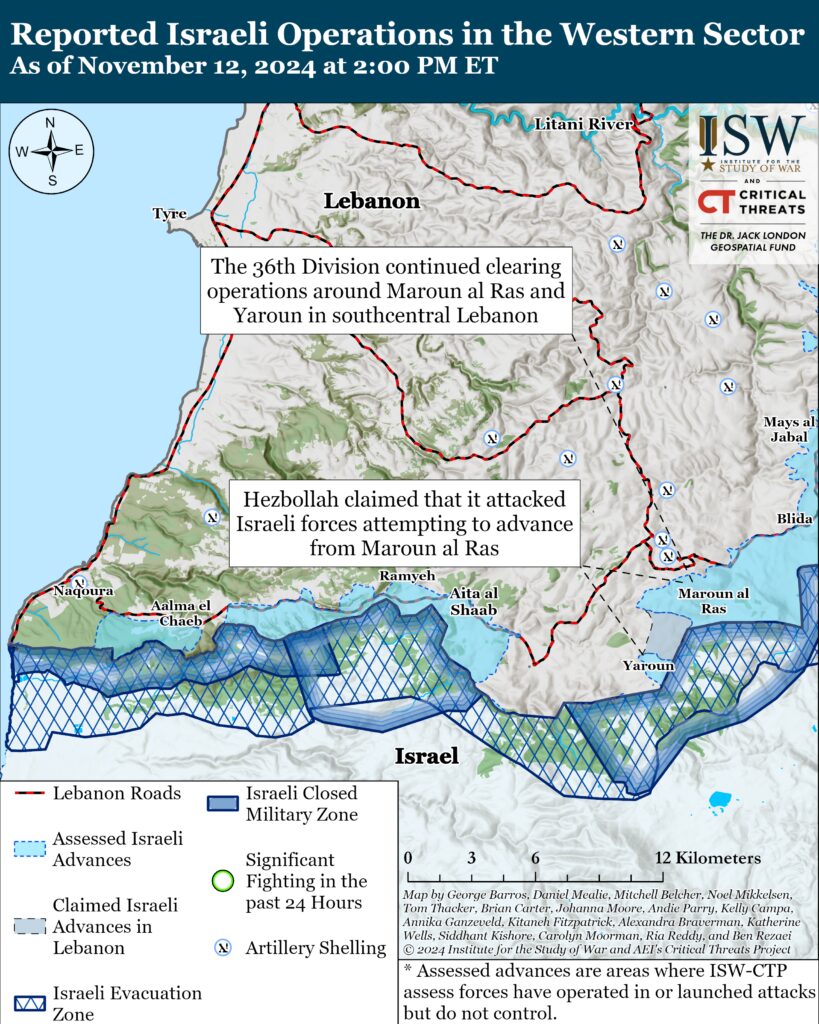
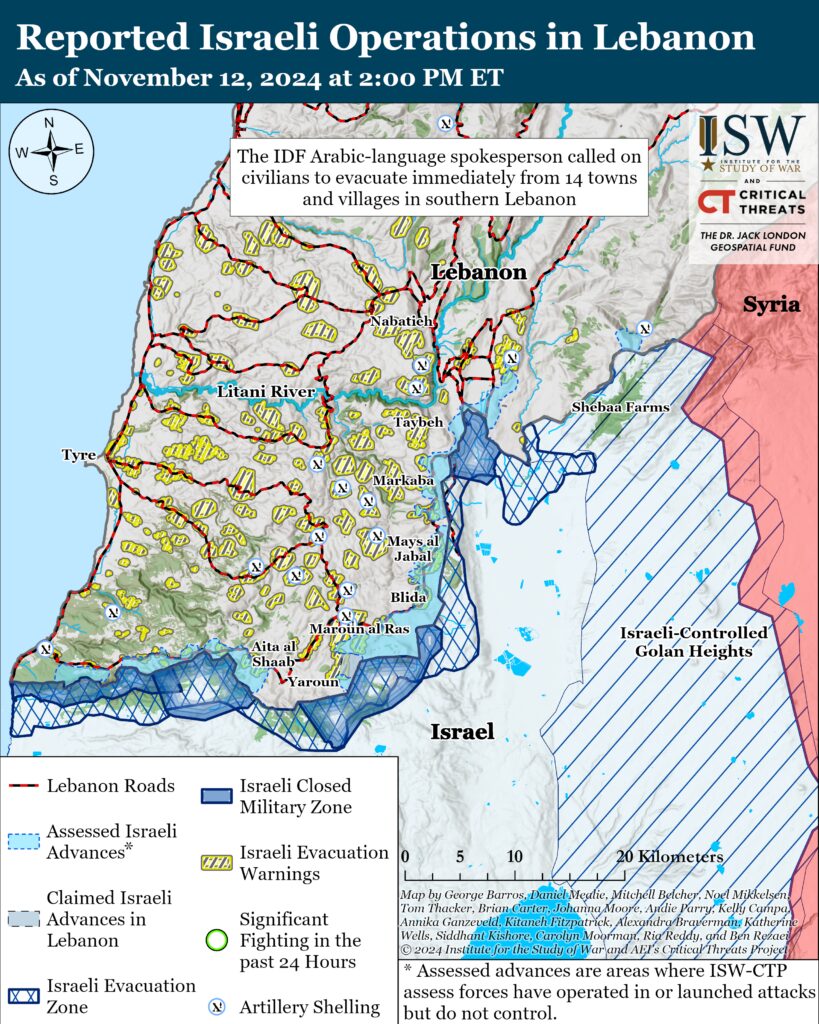
The IDF continued its air campaign to degrade Hezbollah’s capabilities and infrastructure on November 12. The IDF conducted approximately 100 airstrikes across Lebanon since CTP-ISW’s last data cutoff on November 11.[49] The IDF reported it struck a Hezbollah military site in the Bekaa Valley that included underground rocket launchers and tunnels.[50]
The IDF reported on November 12 that it has destroyed “most” missile warehouses and ammunition depots in Dahiya, southern Beirut.[51] The IDF stated Hezbollah stored ”hundreds” of missiles and rockets in facilities under civilian buildings in Dahiya. The IDF identified a missile production facility located under five residential apartment buildings in the al Choueifat neighborhood, in southern Beirut. The IDF reported that the missiles produced in the underground facility could reach all of Israel’s territory.
The IDF Arabic-language spokesperson called on civilians to evacuate immediately from 14 towns and villages in southern Lebanon on November 12.[52] The spokesperson told residents that they should head north of the Awali River.[53] Most of the towns from which the IDF asked Lebanese civilians to evacuate are located along the first and second lines of villages along the Israel-Lebanon border. The IDF has previously ordered all but one of these towns to evacuate. The spokesperson said that the IDF will act ”forcefully” against Hezbollah activities in these towns.[54]
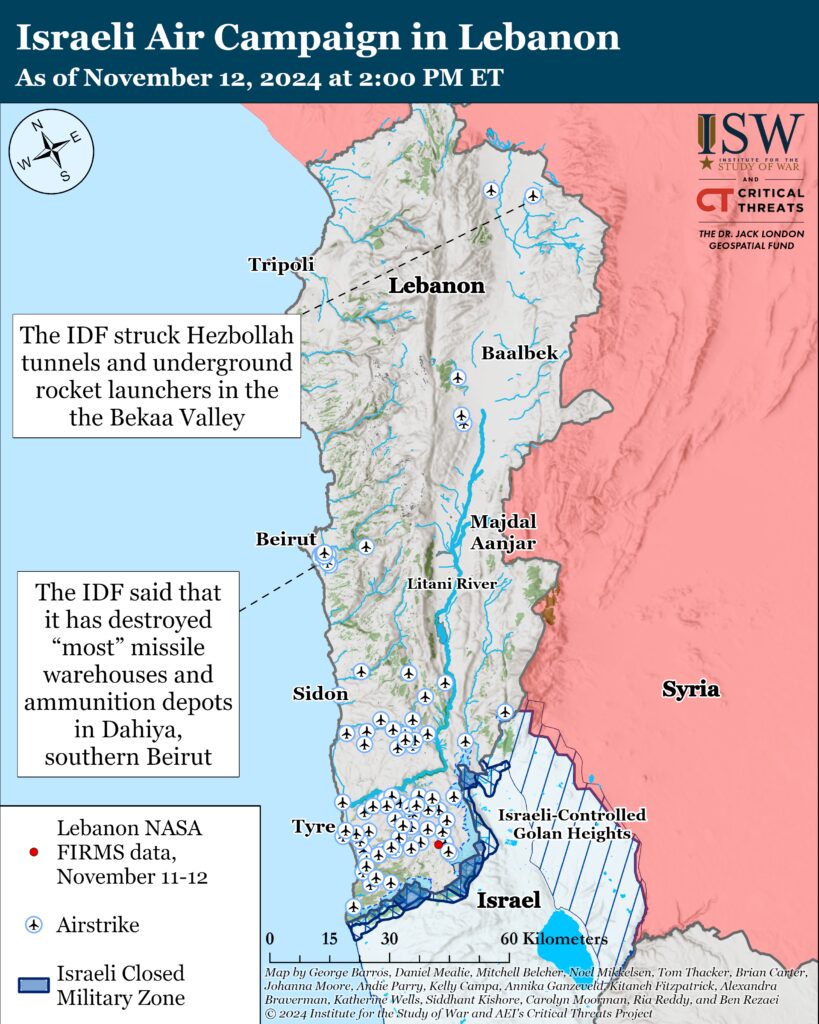
This map illustrates individual Israeli air and artillery strikes based on local Lebanese reporting. This map depicts strikes reported from 2:00pm ET on November 11 to 2:00pm ET on November 12. This map is not exhaustive. CTP-ISW cannot independently verify the locations of Israeli strikes.
Hezbollah has conducted at least 14 drone and rocket attacks into Israel since CTP-ISW’s data cutoff on November 11. [55] Hezbollah attacked two IDF Air Bases, including Tel Nof Air Base near Tel Aviv, with ”high quality” rockets.[56] Hezbollah conducted the air base attacks under its ”Khaybar“ campaign. The Khaybar campaign seeks to respond to Israel for killing Hassan Nasrallah. Khaybar operations often target deeper and more militarily significant sites in Israel than standard Hezbollah attacks on Israeli forces near the Israel-Lebanon border. Hezbollah also launched one-way attack drones targeting an IDF 146th Division logistics base near Nahariya.[57] The IDF last acknowledged that the 146th Division operated against Hezbollah in southwest Lebanon on November 1.[58] Hezbollah also attacked Israeli forces with rockets in towns near the IDF axes of advance into southern Lebanon.[59]
A likely Hezbollah drone struck a kindergarten in the Haifa suburb of Nesher on November 12. The drone struck outside the kindergarten while the children were in a bomb shelter and did not cause casualties.[60] Israeli journalists reported that the IDF alert system did not sound in Nesher but did activate in neighboring areas.[61] Hezbollah did not claim a drone attack at the same time or area as the strike, nor did it explicitly acknowledge the strike. Hezbollah similarly did not claim its rocket attack that struck a soccer field of Druze children in Majdal al Shams on July 27.[62] It is more likely that Hezbollah’s Majdal al Shams strike was unintentional and caused by technical failures inherent to rockets. One-way-attack drones, however, are much more accurate than rockets. Drones can still suffer failures and miss their intended targets as a result of electronic warfare or a partial interception. Hezbollah’s decision in early 2024 to transition from less-sophisticated rocket and anti-tank guided missile systems to more advanced and deadly rockets, one-way attack drones, and anti-tank guided missile systems increased the risk that a Hezbollah attack would cause significant Israeli casualties, either intentionally or due to a miscalculation.[63]
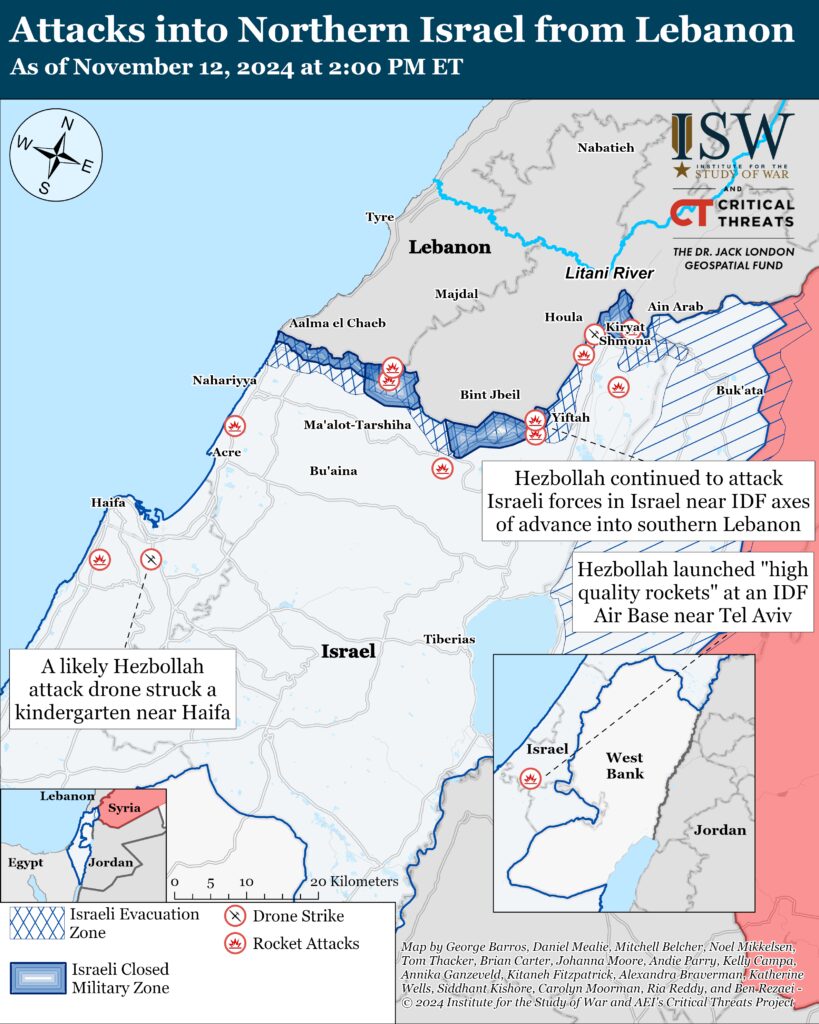
Iran and the Axis of Resistance
Israeli Prime Minister Benjamin Netanyahu stated that Iran’s October 1 ballistic missile attack on Israel cost Iran $2.3 billion in an English-language video addressed to the Iranian people.[64] Netanyahu stated that Iran’s attack caused only ”marginal damage“ to Israel. Netanyahu claimed that another Iranian attack on Israel would ”simply cripple” the Iranian economy.
International Atomic Energy Agency (IAEA) Director Rafael Grossi emphasized the urgency of finding diplomatic solutions to resolve outstanding issues regarding Iran’s nuclear program.[65] Grossi, speaking to reporters on the sidelines of the COP29 summit in Baku, Azerbaijan, said that the international situation is limiting the ability of the IAEA and others to devise diplomatic solutions to influence Iran’s relationship with the IAEA. The IAEA has continuously reported that Iran has hindered its ability to monitor the Iranian nuclear program, which has jeopardized trust between the two parties. Grossi’s reference to the international situation is probably a reference to the ongoing Israel-Iran escalation. The ongoing tit-for-tat between Iran and Israel has changed the way that Iranian officials are talking about the development of nuclear weapons, with some Iranian officials speaking increasingly openly about the development of these systems. Grossi will travel to Iran on November 13 to discuss the March 2023 joint statement with senior Iranian government officials.[66] The March 2023 joint statement refers to an Iranian agreement to reinstall IAEA monitoring equipment at its nuclear sites and grant IAEA inspectors access to three previously undeclared nuclear sites.[67]
Iraqi National Security Adviser Qassem al Araji continued to meet with senior Iranian security and military officials in Tehran on November 11. Araji discussed Israel and the United States’ “misuse” of Iraqi airspace during the October 25 IDF strikes into Iran in separate meetings with Iranian Supreme National Security Council Secretary Rear Admiral Ali Akbar Ahmadian and IRGC Commander Major General Hossein Salami.[68] Ahmadian and Salami likely emphasized Israel’s use of Iraqi airspace to try to compel the Iraqi federal government to allow Iran to attack Israel from Iraq if the Iranian regime were to decide to conduct such an attack. The Iranian regime almost certainly recognizes that Araji, and the Iraqi federal government generally, cannot prevent Israel from using Iraqi airspace to strike Iran. They therefore more likely sought to pressure the Iraqi federal government to tolerate a combined Iranian and Iranian-backed Iraqi militia attack against Israel. CTP-ISW previously noted that a direct Iranian attack against Israel via its proxies in Iraq would underline the extent to which Iran has increased its military and political control over federal Iraq.[69]
Araji separately discussed the implementation of the March 2023 security agreement between Iran and Iraq with Ahmadian and Salami.[70] This agreement requires Iraqi authorities to disarm and relocate members of Kurdish opposition groups away from the Iran-Iraq border.[71]
US Ambassador to Iraq Alina Romanowski met with newly-elected Iraqi Parliament Speaker Mahmoud al Mashhadani on November 11.[72] Mashhadani’s office reported that he and Romanowski discussed “enhancing cooperation” between the United States and Iraq.[73] Mashhadani is backed by the Shia Coordination Framework, which is a loose coalition of Iranian-backed Iraqi political parties.[74]
The Islamic Resistance in Iraq—a coalition of Iranian-backed Iraqi militias—has claimed three attacks targeting Israel since CTP-ISW’s last data cutoff on November 11. The claims include the following:
A drone attack targeting an unspecified military target in southern Israel.[75]
A drone attack targeting an unspecified military target in northern Israel.[76]
A drone attack targeting an unspecified “vital target” in northern Israel.[77]The IDF reported on November 11 that it intercepted a drone launched “from the east” over the southern Golan Heights.[78]
The Islamic Resistance in the Land of the Two Holy Mosques, an Iranian-backed militia claiming to operate in Saudi Arabia, claimed a drone attack targeting Eilat on November 11.[79] This attack marks the fifth time that the Islamic Resistance in the Land of the Two Holy Mosques has claimed an attack targeting Israel since October 25.[80] The IDF intercepted a drone launched “from the east” near Wadi Araba on November 11.[81] Wadi Araba is a region that extends from the southern end of the Dead Sea to the Gulf of Aqaba and is divided between Israel and Jordan.[82] The IDF announced the interception approximately 30 minutes before the Islamic Resistance in the Land of the Two Holy Mosques claimed the attack on Eilat.[83]
Iranian First Vice President Mohammad Reza Aref met with Saudi Crown Prince Mohammad bin Salman on the sidelines of the emergency Organization of Islamic States (OIC) and Arab League summit in Riyadh, Saudi Arabia, on November 11, to discuss Israeli operations in Lebanon and the Gaza Strip and cooperation.[84] Aref and Mohammad bin Salman discussed opportunities for bilateral cooperation between Iran and Saudi Arabia to ensure the “development of stability and security in the region.” Salman reaffirmed Saudi Arabia’s commitment to deepening ties with Iran by March 2025, likely to placate Iran without promising concrete action against Israel. Aref extended an invitation to Salman to visit Iran.
Iranian Foreign Affairs Ministry Senior Adviser for Policy Ali Asghar Khaji held a meeting with Syrian Deputy Foreign Affairs Minister Ayman Raad on the sidelines of the 22nd International Astana meeting in Astana, Kazakhstan, on November 12.[85] Khaji emphasized Iran’s support for regional efforts to “stand up” against Israeli operations. Khaji and Raad discussed expanding cooperation between Iran and Syria to limit regional escalation. The Astana talks aim to end the Syrian conflict and negotiate Syrian-Turkish normalization.[86] Khaji expressed his support for “rapprochement and restoration ties” between Turkey and Syria.
Iranian Artesh Air Force Commander Brigadier General Hamid Vahedi visited the Chinese International Aviation & Aerospace Exhibition in Zhuhai on November 12.[87] Vahedi evaluated J-10 capabilities, highlighting Iran’s interest in advanced military technologies. General Vahedi also met with People’s Liberation Army Air Force Commander, General Chang Dingqiu, and discussed potential areas for cooperation.[88] Iran has increasingly focused on modernizing its air force through advanced fighter acquisitions and domestic technology development. Iran likely reached an agreement with Russia in late 2022 to acquire Su-35 fighter jets, potentially as part of a trade involving Iranian military support for Russia’s actions in Ukraine.[89] Iranian officials have denied reports suggesting an imminent delivery of Russian Su-35 fighter jets to Iran, however.[90] Egypt also recently signed an agreement with China to acquire Chengdu J-10C fighter jets in August 2024, aiming to replace its aging fleet of American-made F-16s.[91]
IRGC Quds Force Coordination Deputy Brigadier General Eraj Masjedi met with the interim Friday Prayer Leader and Supreme Leader Ali Khamenei’s representative in Khorasan Razavi, Ahmad Alam Al Hoda on November 12.[92] Alam Al Hoda praised the Quds Force for its role in safeguarding Iran’s security and supporting the Axis of Resistance. Masjedi also delivered a report on nationwide public support for the Axis of Resistance.[93]
The United States and the United Kingdom continue to conduct airstrikes on Houthi targets in Yemen according to Houthi media. Houthi media reported three US-UK airstrikes in the al Faza neighborhood in the al Tuhayta district, southern al Hudaydah governorate late on November 11.[94] Houthi media also reported a US-UK airstrike on a ”civilian car” in al Sawmah District, western al Bayda governorate, early on November 12.[95]
The Houthis conducted a complex drone, ballistic, and cruise missile attack targeting two US Navy destroyers near the Bab al Mandeb on November 11. A US Defense Department spokesperson said that the US Navy destroyers intercepted at least eight drones, five ballistic missiles, and three cruise missiles targeting the two ships on November 11.[96] The Houthi military spokesperson claimed the attack.[97] The spokesperson also falsely claimed a second attack targeting the USS Abraham Lincoln aircraft carrier.[98] The US Defense Department clarified that it had no knowledge that any such attack occurred.[99]
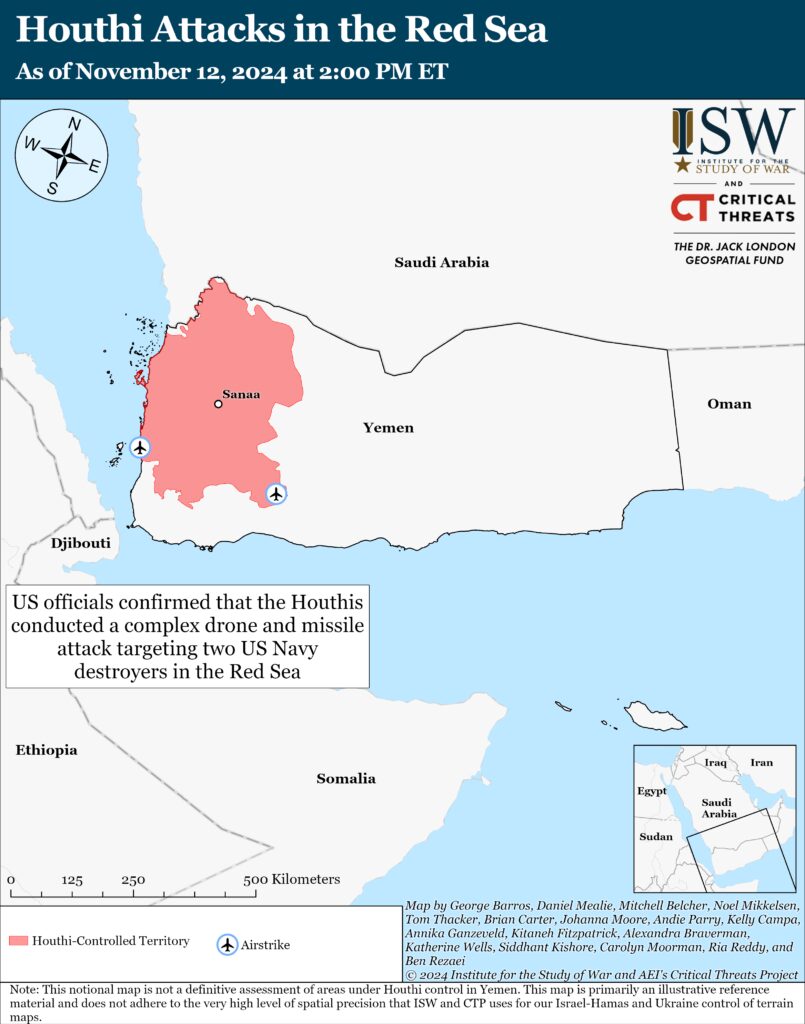
The Iran Update provides insights into Iranian and Iranian-sponsored activities abroad that undermine regional stability and threaten US forces and interests. It also covers events and trends that affect the stability and decision-making of the Iranian regime. The Critical Threats Project (CTP) at the American Enterprise Institute and the Institute for the Study of War (ISW) provides these updates regularly based on regional events.
CTP-ISW defines the “Axis of Resistance” as the unconventional alliance that Iran has cultivated in the Middle East since the Islamic Republic came to power in 1979. This transnational coalition is comprised of state, semi-state, and non-state actors that cooperate to secure their collective interests. Tehran considers itself to be both part of the alliance and its leader. Iran furnishes these groups with varying levels of financial, military, and political support in exchange for some degree of influence or control over their actions. Some are traditional proxies that are highly responsive to Iranian direction, while others are partners over which Iran exerts more limited influence. Members of the Axis of Resistance are united by their grand strategic objectives, which include eroding and eventually expelling American influence from the Middle East, destroying the Israeli state, or both. Pursuing these objectives and supporting the Axis of Resistance to those ends have become cornerstones of Iranian regional strategy.
 Eurasia Press & News
Eurasia Press & News
